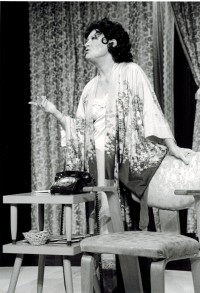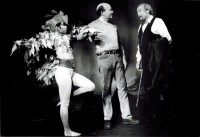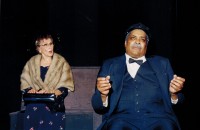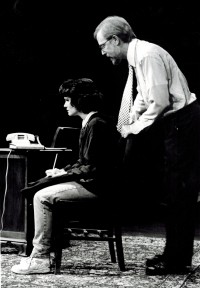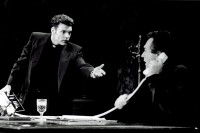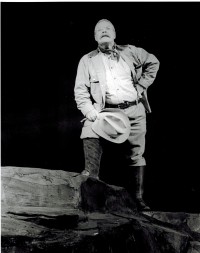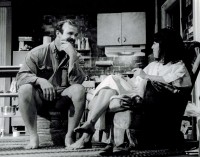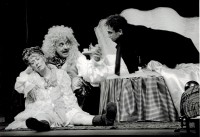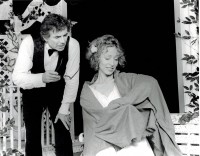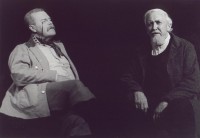1996 Season
Cock-a-Doodle-Doo
A world premiere.
Driving Miss Daisy
The place is the Deep South, the time 1948, just prior to the civil rights movement. Having recently demolished another car, Daisy Werthan, a rich, sharp-tongued Jewish widow of seventy-two, is informed by her son, Boolie, that henceforth she must rely on the services of a chauffeur. The person he hires for the job is a thoughtful, unemployed black man, Hoke, whom Miss Daisy immediately regards with disdain and who, in turn, is not impressed with his employer’s patronizing tone and, he believes, her latent prejudice. But, in a series of absorbing scenes spanning twenty-five years, the two, despite their mutual differences, grow ever closer to, and more dependent on, each other, until, eventually, they become almost a couple. Slowly and steadily the dignified, good-natured Hoke breaks down the stern defenses of the ornery old lady, as she teaches him to read and write and, in a gesture of good will and shared concern, invites him to join her at a banquet in honor of Martin Luther King, Jr. As the play ends Hoke has a final visit with Miss Daisy, now ninety-seven and confined to a nursing home, and while it is evident that a vestige of her fierce independence and sense of position still remain, it is also movingly clear that they have both come to realize they have more in common than they ever believed possible—and that times and circumstances would ever allow them to publicly admit.
Oleanna
A college student, Carol, drops by her professor’s office in an effort to gain his help to do better in class. John, the professor, in the midst of buying a house to celebrate his nomination for tenure, at first seems distant. As the first meeting progresses the two discuss the nature of understanding and judgment in society, as well as their very own natures and places in our society. It seems as if a bond has been made. When next they meet we find that a report has been filed to the tenure committee. Carol has joined a “group” and has decided that John sexually harassed her during their first meeting. Their second meeting dissects the first; every word, every nuance of the first meeting has been twisted into something else. Or has it? John’s unsuccessful attempts to convince Carol to retract her accusation escalate to a more dangerous level. The third meeting, one the court officers warned against, climaxes violently, leaving John and Carol both physically and emotionally devastated.
Mass Appeal
Father Tim Farley, a lover of the good things in life, is comfortably ensconced as priest of a prosperous Catholic congregation. Without realizing it, he has resorted to flattering his parishioners and entertaining them with sermons that skirt any disturbing issues, in order to protect his Mercedes, his trips abroad and the generous supply of fine wines that grace his table (and his desk drawer). His well-ordered world is disrupted by the arrival of Mark Dolson, an intense and idealistic young seminarian whom Father Farley reluctantly agrees to take under his wing. There is immediate conflict between the two as the younger man challenges the older priest’s sybaritic ways, while Father Farley is appalled by Mark’s confession that he had led a life of bisexual promiscuity before entering the priesthood. In the final essence their confrontation is a touching yet very funny examination of the nature of friendship, courage and the infinite variety of love, as the older man is reminded of the firebrand he once was, and the younger comes to realize that forbearance is as vital to the Christian ethic as righteousness.
Frankie and Johnny in the Clair de Lune
The setting is a walk-up apartment on Manhattan’s West Side where, as the curtain rises, Frankie (a waitress) and Johnny (a short-order cook who works in the same restaurant) are discovered in bed. It is their first encounter, after having met several weeks ago on the job, and Frankie is hopeful that Johnny will now put on his clothes and depart, so she can return to her usual routine of watching TV and eating ice cream. But Johnny, a compulsive talker (and romantic), has other ideas. He is convinced that he loves Frankie, a notion that she, at first, considers to be ridiculous. She has had more disappointments than delights in life, and he is the veteran of one broken marriage already. And neither of them is in the bloom of youth. Yet out of their sometimes touching, sometimes hilarious interplay the promise of a relationship beyond a “one-night stand” does begin to emerge and, as the lights dim, the two are back in bed again, but this time side-by-side, holding hands before the glowing television screen.
Uh-Oh Feydeau
A world premiere.
The Diaries of Adam and Eve
Mark Twain’s The Diaries of Adam and Eve, is a uniquely American theatre piece, funny, beautiful, and deeply moving. David Birney has crafted a light-hearted look at the world’s first love story through the eyes of America’s greatest humorist, Mark Twain, whose Garden of Eden bursts with wit, laughter and the lyric poignance of the first love and the first loss.
John and Teddy
A world premiere.
